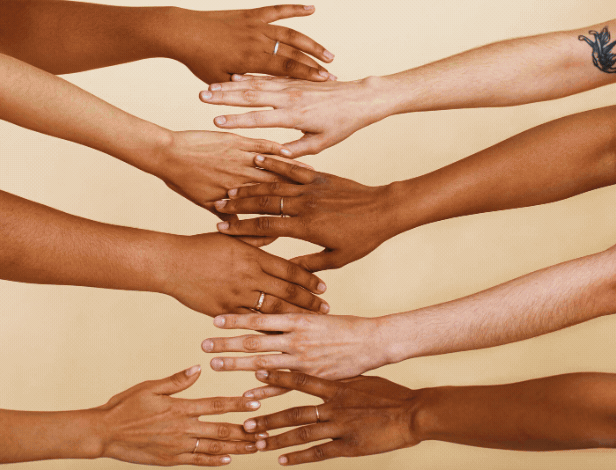Whether we like to admit it or not, society is segregated. People are divided by various social markings and positions. Whether it is wealth, tribe, religion, or personal preferences, people often move toward their identity. However, the topic of discrimination when it comes to skin colour is a touchy subject that not many people are openly discriminatory about.
Colourism, much like racism, is a form of discrimination that often regards dark skin as inferior and light or fair skin as superior. This ideology is passed through society, enforcing the belief that dark skin is ugly and unacceptable.
The root of colourism
Image Credit: PinterestUnderstanding colourism cannot happen without first understanding the root cause. Multiple studies have shown that racism as a result of colonialism is the origin of colourism. All over the world, people of African descent or people with darker skin tones are constantly discriminated against for their skin colour. As a result of this discrimination and the apparent preference of society for light-skinned or fair individuals, people with dark skin begin to yearn for social acceptance by bleaching their skin. While bleaching is frowned upon by health practitioners, the issue is rooted in colourism, which is, in its place, a societal issue.
Like any societal issue, commentary on colourism can be seen on various social media platforms, especially X (formerly known as Twitter)
Negative effects of colourism
Image Credit: PinterestColourism in Nigeria, like in many other societies, has profound effects on individuals and communities. Some of the critical effects of colourism in Nigeria include:
Psychological Impact
Colorism can significantly impact individuals, particularly those with darker skin tones. Discrimination based on skin tone can lead to feelings of inferiority and low self-esteem. This can contribute to mental health issues such as depression, anxiety, and identity struggles.
Socio-Economic Disparities
Colorism perpetuates socio-economic disparities by favouring individuals with lighter skin tones in various aspects of life, including education, employment, and social mobility. Lighter-skinned individuals may have greater access to opportunities, resources, and privileges compared to their darker-skinned counterparts, leading to systemic inequalities and perpetuating cycles of poverty.
Beauty Standards
Colourism reinforces narrow beauty standards, prioritising lighter skin tones as the epitome of beauty and desirability. This can lead to harmful beauty practices such as skin bleaching, where individuals use chemical products to lighten their skin in pursuit of societal beauty ideals. Skin bleaching can have severe health consequences, including skin damage, cancer risk, and psychological harm.
Social Relationships
Colourism can affect social relationships and interactions, leading to discrimination, prejudice, and exclusion based on skin tone. Lighter-skinned individuals may receive preferential treatment or social privileges, while darker-skinned individuals may face social stigma, ridicule, and marginalisation. This can impact interpersonal relationships, social dynamics, and community cohesion.
Cultural Identity
Colourism can affect individuals’ sense of cultural identity and belonging. Due to society’s privileging of lighter skin tones, those with darker skin tones may feel disconnected from their cultural heritage or experience cultural erasure. This can lead to feelings of alienation, cultural insecurity, and identity crises among darker-skinned individuals.
Overall, colourism in Nigeria perpetuates systemic inequalities, reinforces harmful stereotypes, and undermines individuals’ well-being and sense of self-worth.
Curbing colourism
Image Credit: PinterestTackling colourism takes time and involves changing both our individual and collective ways of thinking. We must confront it wherever it appears, from our workplaces and the media to our personal relationships and broader societal systems. Here are some steps we can take to fight it across these areas.
Media Representation
Advocate for more diverse and inclusive representation in media, advertising, and popular culture. Encourage media outlets to feature a wide range of skin tones and celebrate the beauty of diversity. Support content creators and platforms that promote positive representations of all skin tones.
Beauty Standards
Challenge narrow beauty standards prioritising lighter skin tones and Eurocentric features. Promote diverse beauty ideals that celebrate the unique characteristics of all skin tones and ethnicities. Encourage the beauty industry to offer a wide range of products and services that cater to diverse skin tones.
Self-Reflection and Unlearning Bias
Encourage individuals to examine their own biases and unlearn colourist attitudes. Promote self-reflection and critical thinking about the impact of colourism on society and individuals. Provide resources and tools for individuals to challenge and confront their prejudices.
Education and Awareness
Promote education and awareness campaigns to highlight the harmful effects of colourism and challenge ingrained biases. Implement educational programs in schools and communities that teach the importance of diversity, inclusivity, and self-acceptance.
Colourism will affect our society deeply until we take concrete steps to fight it. By putting these steps into action and nurturing an environment where everyone feels included and accepted, we’re on the path to diminishing colourism. This effort can lead us to a fairer and more diverse society, where we celebrate individuals for their skills, personality, and contributions without bias towards their skin colour.

